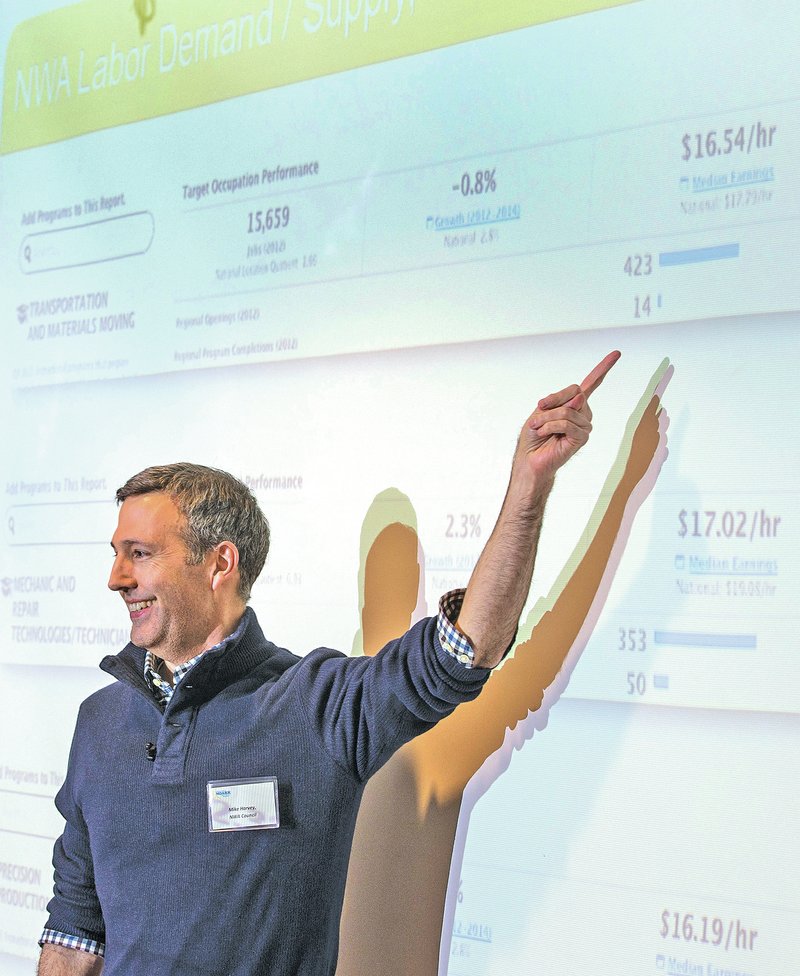SPRINGDALE -- Northwest Arkansas' supply of skilled workers already lags behind demand, and the skilled workforce the region does have is aging, the chief operating officer for the Northwest Arkansas Council said Thursday.
Almost half the teachers in Northwest Arkansas and three-fifths of the region's tool and die makers are older than 45, said Michael Harvey in a presentation to the Northwest Arkansas Human Resources Association. The group met Thursday to formulate a strategy their employers and the council can use to address skilled labor shortages, said association spokesman Brent Carroll.
Other types of skilled employment face similar situations, both Harvey and attendees of the conference said. Harvey cited federal labor statistics.
Deb Cook is a human resource director for FM Corp. in Rogers, which makes molded plastic products. Those products are used in machinery for medical testing and analysis. Making those components requires a trained engineer known as a process tech, Cook said.
"It's very difficult to find experienced people at this," Cook said. "We have trained people in-house, but it takes three to four years to get someone to that skill level. Every one of these machines we make is part of a special order. We've had special orders as low as 50 units."
Production of each batch requires engineering of its own, she said. That requires working out a new process for each order.
"At some point, the people we have will want to retire," she said.
Kathy Deck , director of the Center for Business and Economic Research at the University of Arkansas, addressed the issue at a meeting last month. The state's employers say they can't find workers with the needed skills, she said, adding that employers don't seem to be willing to increase wages to attract the workers they require. Deck made those remarks at the 21st annual Business Forecast Lunch in Fayetteville last month. She said both pay and worker training were issues.
Harvey said Northwest Arkansas employers had jobs paying up to $25 an hour they couldn't fill even during the recent historic highs of joblessness.
"To those who say that this is just a pay issue, that employers need to pay more, I say that employers were finding this to be an issue in the depths of the recession," Harvey said.
"We've been trying to 'attract' our way out of this for years," he said of recruiting workers to Northwest Arkansas. Part of the reason the strategy hasn't met the need is a reluctance of people from larger metropolitan regions to move to Arkansas, he said.
"Once we get them here they love it," Harvey said. But possible recruits don't realize it's one large metropolitan area.
Harvey has kept a database of calls from business owners he has received since coming to Northwest Arkansas in 2011, he said. The council is a group of business, government and community leaders who track and develop solutions for regional problems. Harvey's data is now based on thousands of calls, he said, and skilled labor is the highest priority.
Harvey's remarks come six days after school superintendents from four local school districts and two members of the Arkansas Board of Education met to discuss addressing the skilled labor shortage. That panel convened at the invitation of the Government Relations Committee of the Fayetteville Chamber of Commerce.
Northwest Arkansas needs both workers with bachelor's degrees and those who have training beyond a high school education, but less than a four-year degree, said Kim Davis, Education Board member, at that meeting. Davis is also director of external relations and economic development for the Northwest Arkansas Council.
Northwest Arkansas' education system is cooperating with efforts to supply appropriately trained workers, but employers have not given those educators a clear idea of what's needed in the past, Harvey said.
NW News on 02/13/2015
